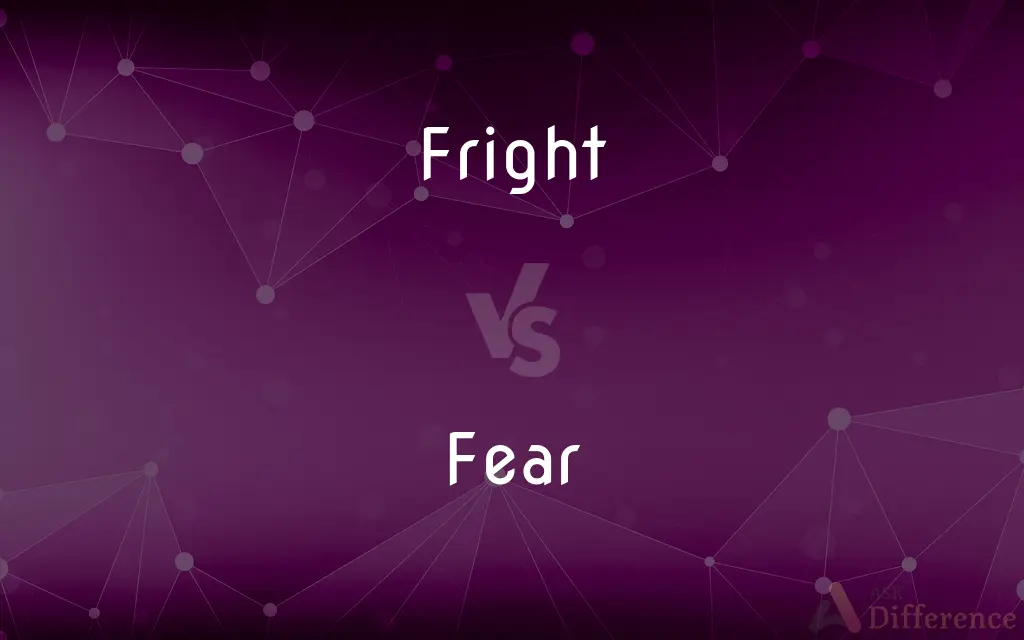Fright vs. Fear — What's the Difference?
Edited by Tayyaba Rehman — By Fiza Rafique — Updated on April 2, 2024
Fright is a sudden, intense fear reaction, while fear is a sustained, emotional response to perceived threats.

Difference Between Fright and Fear
Table of Contents
ADVERTISEMENT
Key Differences
Fright is characterized by an immediate, intense reaction to a sudden and unexpected threat, activating the body's acute stress responses, such as increased heart rate and adrenaline rush. In contrast, fear is a more prolonged, emotional state or anticipation of danger, which can be triggered by both immediate and future threats, often leading to caution or avoidance behaviors.
While fright is typically short-lived, dissipating once the perceived threat is gone or understood, fear can persist over time, influencing an individual's decisions and actions even in the absence of immediate danger. This distinction highlights how fright is a response to immediate stimuli, whereas fear involves a more complex emotional processing of potential risks.
Fear can be based on real or imagined threats, leading to a range of psychological effects, including anxiety, stress, and caution. Fright, however, is usually a reaction to a real and present danger, often resulting in a "fight or flight" response with less conscious thought involved in the reaction process.
The physical manifestations of fright are often more intense but shorter in duration compared to those of fear. For example, a person experiencing fright might scream, jump, or have a rapid heartbeat for a brief period, whereas fear might result in a sustained feeling of unease, tension, or dread.
In terms of coping mechanisms, individuals might seek immediate safety or reassurance in response to fright, while managing fear often requires longer-term strategies, such as confronting the feared object or situation, seeking support, or using relaxation techniques to mitigate the emotional and physiological effects.
ADVERTISEMENT
Comparison Chart
Duration
Short-term, immediate
Long-term, sustained
Trigger
Sudden and unexpected threats
Real or imagined threats
Emotional State
Intense but brief
Prolonged, with anticipation
Physical Response
Acute, e.g., increased heart rate
Varied, e.g., tension, unease
Coping Mechanism
Immediate reaction for safety
Strategies for long-term management
Compare with Definitions
Fright
Typically resolved quickly once the threat passes.
After realizing the shadow was just a coat rack, her fright dissipated.
Fear
A sustained emotional response to perceived danger.
The fear of heights kept him from climbing the ladder.
Fright
A sudden, intense fear reaction to an unexpected threat.
The loud noise caused an immediate fright, making her jump.
Fear
Results in both physical and psychological effects.
His fear of public speaking caused sweating and a desire to avoid presentations.
Fright
Elicits a quick "fight or flight" response.
She felt a jolt of fright when the thunder crashed, instinctively seeking shelter.
Fear
May persist and influence behavior over time.
Her fear of the dark influenced her to always keep a light on at night.
Fright
Often results in an immediate physical reaction.
The fright from seeing a spider caused him to leap out of his chair.
Fear
Can lead to prolonged anxiety and caution.
The fear of failure often prevented him from trying new challenges.
Fright
Sudden intense fear, as of something immediately threatening.
Fear
Fear is an emotion induced by the perception or recognition of phenomena which can pose a danger or threat. Fear causes physiological changes and therefore may produce behavioral changes, such as mounting an aggressive response or fleeing the threat.
Fright
(Informal) Something extremely unsightly, alarming, or strange
Brush your hair.
You look a fright.
Fear
A very unpleasant or disturbing feeling caused by the presence or imminence of danger
Our fears intensified as the storm approached.
Fright
To frighten.
Fear
A state or condition marked by this feeling
Living in constant fear of attack.
Saved as much as he could for fear of losing his job.
Fright
A state of terror excited by the sudden appearance of danger; sudden and violent fear, usually of short duration; a sudden alarm.
Fear
A feeling of disquiet or apprehension
A fear of looking foolish.
Fright
Someone strange, ugly or shocking, producing a feeling of alarm or aversion.
Fear
A reason for dread or apprehension
Being alone is my greatest fear.
Fright
To frighten.
Fear
Extreme reverence or awe, as toward a deity.
Fright
(rare) frightened; afraid; affright
Fear
To be afraid or frightened of
A boy who fears spiders.
Fright
A state of terror excited by the sudden appearance of danger; sudden and violent fear, usually of short duration; a sudden alarm.
Fear
To be uneasy or apprehensive about
We all feared what we would see when the grades were posted.
Fright
Anything strange, ugly or shocking, producing a feeling of alarm or aversion.
Fear
To consider probable; expect
I fear you are wrong. I fear I have bad news for you.
Fright
To alarm suddenly; to shock by causing sudden fear; to terrify; to scare.
Nor exile or danger can fright a brave spirit.
Fear
To revere or be in awe of (a deity, for example).
Fright
An emotion experienced in anticipation of some specific pain or danger (usually accompanied by a desire to flee or fight)
Fear
To be afraid
Your injury is minor. Don't fear.
Fright
Cause fear in;
The stranger who hangs around the building frightens me
Fear
To be uneasy or apprehensive
We fear for the future of the business.
Fear
(uncountable) A strong, uncontrollable, unpleasant emotion or feeling caused by actual or perceived danger or threat.
He was struck by fear on seeing the snake.
Fear
(countable) A phobia, a sense of fear induced by something or someone.
Not everybody has the same fears.
I have a fear of ants.
Fear
(uncountable) Terrified veneration or reverence, particularly towards God, gods, or sovereigns.
Fear
(transitive) To be afraid of (something or someone); to consider or expect (something or someone) with alarm.
I fear the worst will happen.
Fear
(intransitive) To feel fear.
Never fear; help is always near.
Fear
To worry about, to feel concern for, to be afraid for.
She fears for her son’s safety.
Fear
(transitive) To venerate; to feel awe towards.
People who fear God can be found in Christian churches.
Fear
(transitive) To regret.
I fear I have bad news for you: your husband has died.
Fear
To cause fear to; to frighten.
Fear
To be anxious or solicitous for.
Fear
To suspect; to doubt.
Fear
(dialectal) Able; capable; stout; strong; sound.
Hale and fear
Fear
A variant of Fere, a mate, a companion.
Fear
A painful emotion or passion excited by the expectation of evil, or the apprehension of impending danger; apprehension; anxiety; solicitude; alarm; dread.
Fear is an uneasiness of the mind, upon the thought of future evil likely to befall us.
Where no hope is left, is left no fear.
Fear
Apprehension of incurring, or solicitude to avoid, God's wrath; the trembling and awful reverence felt toward the Supreme Being.
I will put my fear in their hearts.
I will teach you the fear of the Lord.
Render therefore to all their dues; tribute to whom tribute is due . . . fear to whom fear.
Fear
That which causes, or which is the object of, apprehension or alarm; source or occasion of terror; danger; dreadfulness.
There were they in great fear, where no fear was.
The fear of your adventure would counsel you to a more equal enterprise.
Fear
To feel a painful apprehension of; to be afraid of; to consider or expect with emotion of alarm or solicitude.
I will fear no evil, for thou art with me.
Fear
To have a reverential awe of; to be solicitous to avoid the displeasure of.
Leave them to God above; him serve and fear.
Fear
To be anxious or solicitous for; now replaced by fear for.
The sins of the father are to be laid upon the children, therefore . . . I fear you.
Fear
To suspect; to doubt.
Ay what else, fear you not her courage?
Fear
To affright; to terrify; to drive away or prevent approach of by fear.
Fear their people from doing evil.
Tush, tush! fear boys with bugs.
Fear
To be in apprehension of evil; to be afraid; to feel anxiety on account of some expected evil.
I exceedingly fear and quake.
Fear
An emotion experienced in anticipation of some specific pain or danger (usually accompanied by a desire to flee or fight)
Fear
An anxious feeling;
Care had aged him
They hushed it up out of fear of public reaction
Fear
A profound emotion inspired by a deity;
The fear of God
Fear
Be afraid or feel anxious or apprehensive about a possible or probable situation or event;
I fear she might get aggressive
Fear
Be afraid or scared of; be frightened of;
I fear the winters in Moscow
We should not fear the Communists!
Fear
Be sorry; used to introduce an unpleasant statement;
I fear I won't make it to your wedding party
Fear
Be uneasy or apprehensive about;
I fear the results of the final exams
Fear
Regard with feelings of respect and reverence; consider hallowed or exalted or be in awe of;
Fear God as your father
We venerate genius
Common Curiosities
How can fear be managed or reduced?
Managing fear often involves understanding the underlying cause, exposure therapy, cognitive-behavioral strategies, or seeking professional support to address and mitigate the emotional and psychological effects.
What is fright?
Fright is an acute, intense reaction to a sudden and unexpected threat, often triggering a quick "fight or flight" response.
Can fright turn into fear?
Yes, if a sudden threat leads to ongoing concerns about safety or recurrence, the immediate sensation of fright can evolve into a sustained state of fear.
What physical responses are associated with fright?
Fright typically causes immediate, acute physical responses such as an adrenaline rush, rapid heartbeat, or a sudden scream.
How do fright and fear affect decision-making?
Fright can cause immediate, instinctual decisions for safety, while fear can lead to more cautious and sometimes avoidance-based decisions regarding potential threats.
Can animals experience fright and fear?
Yes, animals can experience both fright and fear as part of their survival instincts, reacting to immediate threats and showing caution towards potential dangers.
How does fear differ from fright?
Fear is a more prolonged, emotional response to perceived danger, which can be based on real or imagined threats and affects behavior over a longer term.
Why might someone experience fright without a visible threat?
Sudden, loud noises or unexpected movements can trigger fright as a reflexive response, even if the actual threat is not visible or present.
Are there benefits to experiencing fright or fear?
Both emotions can serve protective roles, alerting individuals to danger and helping to avoid harm, though excessive or irrational fears can be detrimental.
What is the "fight or flight" response in fright?
The "fight or flight" response is an immediate, physiological reaction to a perceived threat, preparing the body to either confront the danger or escape from it.
Is it normal to experience both fright and fear?
Yes, both fright and fear are normal emotional responses to threats, serving as mechanisms to protect individuals from harm.
What role does imagination play in fear?
Imagination can amplify fear by creating or exaggerating scenarios of danger, even in the absence of immediate threats, affecting emotions and behaviors.
How do societal and cultural factors influence fear?
Societal and cultural factors can shape what is perceived as threatening, influencing the prevalence of certain fears and the ways in which people respond to and manage fear.
How do individuals typically recover from fright?
Recovery from fright usually involves realizing the absence of actual harm, calming down from the immediate response, and often seeking reassurance or safety.
How does fear affect mental health?
Prolonged fear can lead to anxiety, stress, and other mental health issues, affecting overall well-being and quality of life.
Share Your Discovery

Previous Comparison
Persistent vs. Stubborn
Next Comparison
Presentation vs. RepresentationAuthor Spotlight
Written by
Fiza RafiqueFiza Rafique is a skilled content writer at AskDifference.com, where she meticulously refines and enhances written pieces. Drawing from her vast editorial expertise, Fiza ensures clarity, accuracy, and precision in every article. Passionate about language, she continually seeks to elevate the quality of content for readers worldwide.
Edited by
Tayyaba RehmanTayyaba Rehman is a distinguished writer, currently serving as a primary contributor to askdifference.com. As a researcher in semantics and etymology, Tayyaba's passion for the complexity of languages and their distinctions has found a perfect home on the platform. Tayyaba delves into the intricacies of language, distinguishing between commonly confused words and phrases, thereby providing clarity for readers worldwide.















































